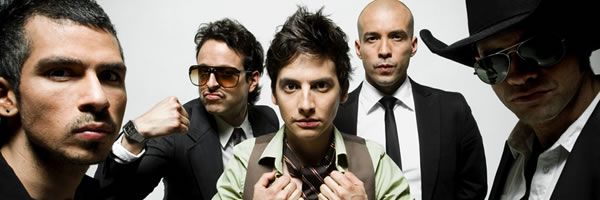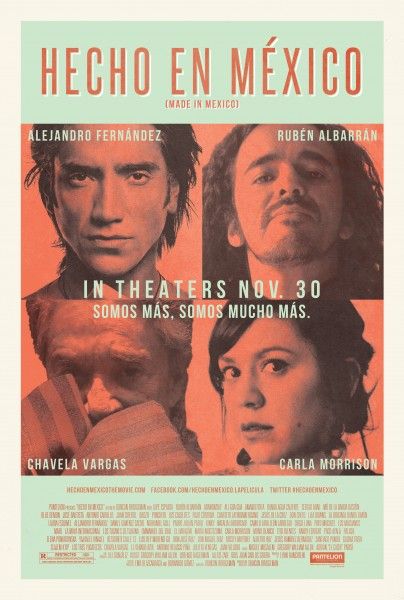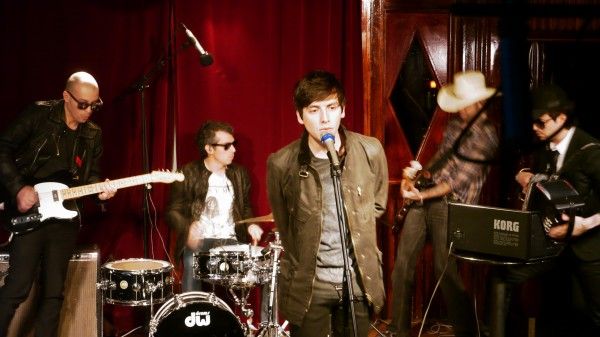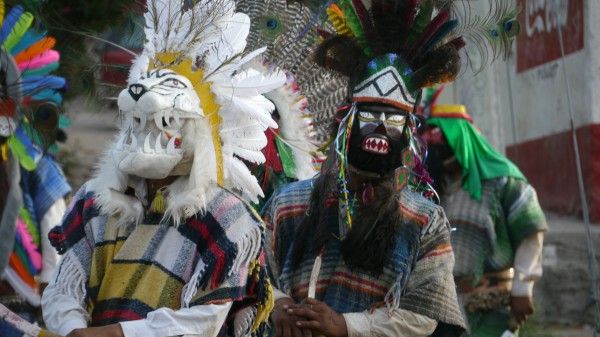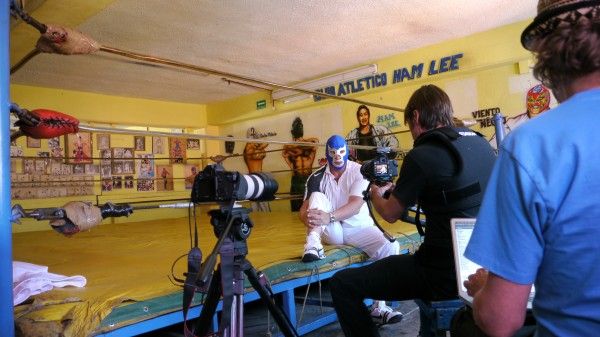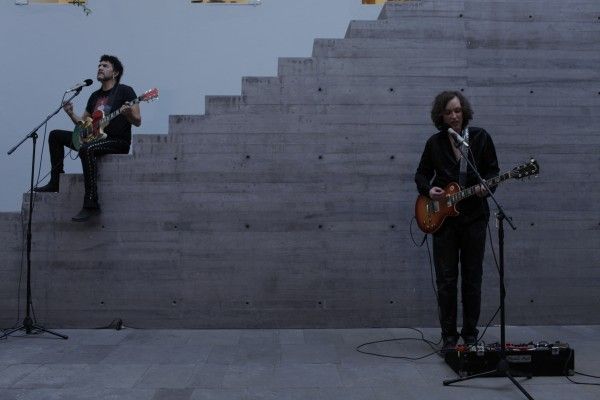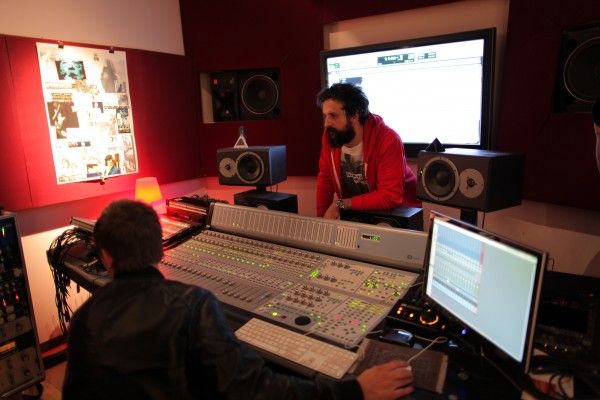Kinky, the popular Mexican alternative rock band, is one of many talented musical groups, singers and celebrities featured in director Duncan Bridgeman’s entertaining documentary, Hecho en Mexico, which showcases the vibrant cultural diversity and richness of Mexico through its music. The five-member band from Monterrey formed in 1998 consists of Gilberto Cerezo, Ulises Lozano, Carlos Chairez, Omar Góngora, and Cesar Pliego whose music is heavily influenced by Latin music, rock, dance, and techno. While the majority of their songs are sung in Spanish, many feature both Spanish and English lyrics.
At the film’s recent press day, lead singer Cerezo and accordionist Lozano talked about their involvement in Bridgeman’s inspiring, often funny musical road trip through modern day “Mexicanity.” They discussed why it’s part of their cultural personality to be playful and poke fun at serious subjects, how they enjoyed being taken out of their comfort zone and given total creative freedom, what they thought when they saw how their work was connected with that of the other musical artists in the finished film, and their plans for an upcoming tour in the States. Hit the jump to read the interview.
Who approached you about this project and why did you decide to say yes?
GILBERT CEREZO: Lynn Fainchtein, the producer, gave me a call. We were in the middle of a tour in Mexico. I personally was familiar with the previous work of the director so I didn’t hesitate about saying yes. Later on, we met Duncan and started working right away on the project.
Did you get to choose which portion of the film you’d be involved in or did the filmmakers tell you which part they wanted you to perform?
CEREZO: I think it was half and half. They gave us a couple of themes and also a couple of musical ideas. We started to work on the first one that came to the table, and from then on, we just went with the flow.
Did you pick the songs or did Duncan?
CEREZO: It was Duncan at first.
ULISES LOZANO: Yes, it was just a basic musical idea that he captured with choles. He showed us the little piece of music that he wanted us to develop from that, because that was going to be the tempo and the key of the songs so he could link all the other artists based on that little musical part.
Did you know what other artists he had in mind that you would perform with in the song?
LOZANO: Yes, they talked about some of the people that they had already approached and had started to work with, and some others were maybe included during the process. But we didn’t know at the end how he was going to link all this music together from the other artists – from pop to rock to cumbia to electronica. It was a surprise then to see how he blended it all together and made it very harmonic and coherent.
During the actual shoot, were you by yourselves or did you perform with another artist?
LOZANO: In our particular case, we were by ourselves.
When you first heard about the film and were interested in it, were you able to visualize what it would look like?
CEREZO: Yes, I could visualize it because I had already seen the previous work of the director and it was about the same idea. It was pretty easy to understand it. I think particularly in this kind of experiment, it’s a process with a lot of jamming and experimentation, and you don’t really know what you’re going to have at the end of it. Even though the idea for the project was structured, nobody really knew what the film was going to be like at the end.
Knowing how big a country Mexico truly is, do you think any other director besides Duncan could have pulled this off?
CEREZO: Yes, definitely. But Duncan has an interesting musical vision that’s important. It’s the key factor that goes all along the movie. It has to be a really good director that also knows about music. Maybe somebody else could have pulled it off, but there are not that many.
Can you talk about being in the Medicina part of the film?
CEREZO: We have our own interpretation of medicine because everybody has different visions of what medicine is for our body, for our mind and for our spirit. We were something in between addiction and medicine. Sometimes medicine is not just the cure, but it can also be what makes you feel a little sicker.
When you saw the final film, did you ever think it would have been nice to have taken part in another segment and explored one of the other themes like Libertad or Fronteras?
CEREZO: All of them. (Laughs) But we are pretty happy with our contribution. We did a little teasing on the Death part of the movie.
LOZANO: El Muerte.
CEREZO: That part of our performance is not in the movie, but it’s going to be on the DVD extras. It’s an issue that most of the Mexicans relate to in a romantic way in our country. It’s not about something that you have to be afraid or scared of. We treat it in a very respectful way, but also in a very playful way. Our contribution in that part is trying to express death in a playful way. We represent it with bones and a skull. We were trying to make a striptease of our own skin and just show the bones in a fun way.
Even though the subjects are varied and some of them are very serious, there is a very playful Mexican atmosphere to all of it. There’s a sense of poking fun at oneself and the way that you are viewed from outside. Was that something you expected to see in the film?
CEREZO: Yes, it’s definitely part of our personality and our identity as a country. We even make fun of serious stuff. That’s the way we overcome the damaged part of the country that we live in. It needs to be shown off in the film, and you can see it because it has different, serious themes to talk about. Some of the characters with their personalities analyze the philosophical part of the theme, but most of us make fun of it.
Your latest album has a number of themes that are related to addiction, celebration, medicine and the consequences. Had you already completed the album before you worked on this project and was this film a natural extension of that?
CEREZO: Actually we were working on the album when Duncan approached us. We took two days off to work with Duncan. So, we were in the middle of this creative process that, as you say, involves a lot of the themes that we were trying to express in the album as well. But the film project was a little bit of a pet project and we were trying to treat it as something separate to fit in. But it’s also nice because we were so involved in the album that to do our part with the music in the film was a little bit like a break.
LOZANO: It was refreshing.
Did you have any idea how the film was going to be edited before you saw the final cut?
CEREZO: That’s the interesting part, because you are actually working with a lot of freedom and not worrying about what’s happening before or next. And, at the end, you realize that you are part of a bigger piece. We were just focused on our song, our performance and our shooting. Everything was centered on that particular piece, although we knew that it was part of a bigger song.
What did you think when you saw the final film and how it all came together?
CEREZO: I think it was fantastic because it’s a really complex idea to realize at first. When you are working on a specific song, you don’t see the big picture as well as the director imagines it. So, watching the complete film at the end was an amazing experience and not to just be that small part of a bigger picture.
What did you enjoy most about being a part of this documentary?
CEREZO: Well, I think it was easy for us to get involved because it was above all about music. After seeing the whole movie, it’s a little more of a complex idea, but our part was focused on getting some tunes about a specific theme. It was also a challenge because it was constructed in a way that we are not used to working. We were given total freedom with a specific tempo and some specific ideas. Challenges are always good because they take you to places where you haven’t been before and that’s also enjoyable at the end of the process. As I was saying before, I think it was being challenged with doing something outside of our comfort zone. I really liked that part of it, and to be honest, the end of it. When I look at the big picture, just being a small part of it makes me like it even more.
As Mexicans, do you think this film represents you?
CEREZO: Yes, it definitely represents a bunch of different parts of Mexico because it’s a big and complex country. I personally think it takes you to parts that you don’t even know exist. That’s the magical part about this movie. That really amazed us, because Mexico is too big to capture it all, but the film takes you to really interesting and magical parts of our country.
Can you talk about what inspires your style?
LOZANO: It’s just my personal style. Since we started the band, Kinky has been a band that likes to involve all this Mexicanity that we are talking about in the music as well. So, for us, maybe we’re not dressed up as Mariachis, but in a way, in our music, we always have that Mexican identity. For us, it’s very important to realize that and have it be very strong in our music, in our passion, and in what we do.
What do you guys have coming up next? Are you going on tour with your own music or will you be recording a new album?
CEREZO: Actually, we just finished our tour in Mexico and we are starting a little run here in the States including Texas, Chicago, Arizona and some parts of California. We’re going to be on that all of December and we’re taking it back in January and February of the next year as well.
Hecho en Mexico is now playing in theaters.

